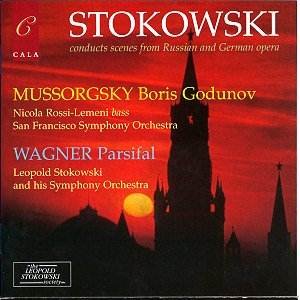Comparison Recordings
Boris Godunov ‘Symphonic Synthesis,’ Stokowski, L’Orchestre de
la Suisse Romande Decca ‘Phase 4’ E4438962
Boris Godunov (Rimsky-Korsakov edition) Issay Dobrowen, Boris
Christoff, bass; (mono) French National Radio Orchestra. EMI 7243
5 65192 2 0
Parsifal excerpts, Stokowski, Houston Symphony Orchestra Everest
EVC 9024
Stokowski first conducted Boris in Philadelphia
in 1929, drawing the various sections from three published ‘original’
editions of the opera. Subsequently he arranged a 25 minute ‘Symphonic
Synthesis’ which was recorded with the Philadelphia Orchestra
on 78 rpm disks, and was hailed as a marvel of high fidelity recording
at the time with its realistic depiction of bell and percussion
sounds. This version was re-recorded in 1968 and released on Decca
‘Phase 4’ Stereo. It is still in print, and the restored original
recording is also available on collectors labels.
This 1952 suite presented here contains choral
and solo selections and includes all the high points of the opera,
making up a little less than a third of the time of a full performance,
skilfully abridged and blended together so as to make a very effective
presentation. Again, for its time, it was a high fidelity demonstration
recording in RCA’s ‘New Orthophonic’ monophonic LP series. The
disk went out of print for many years, and about ten years ago
the Leopold Stokowski Society UK arranged for a copy of the master
tape and issued a private label LP pressing. This CD release is
prepared from that master tape copy. Perhaps technically this
disk should be labelled AAD, but record companies have long made
it a practice to duplicate master tapes at will, generally to
preserve them as old tape formulations and splices began to deteriorate,
so that what any company calls a ‘master’ could be several generations
old by now. We won’t mention the unfortunate fact that disgruntled
sound engineers sometimes steal the original master, replacing
it with a copy, but this has happened.
My original copy of LM 1764 is one of the few
disks I actually wore out. When I was getting to know classical
music this was one of my favourite disks. The work was all but
unknown at the time, and the complete EMI recording with Dobrowen
and Boris Christoff didn’t come out in the US until the late 1950s,
also with the bass soloist singing all the bass roles. It was
a big investment for a college student (4 LPs + book on a premium
label!) and I didn’t buy it. Also, compared scene by scene, even
in abridged versions, the Stokowski version was more dramatic
and in better sound.
And how is the sound on this transfer? The bass
is good, the highs are a little shrill and rolled off. The original
mono tape had primitive built-in reverb enhancement, so that can’t
be used to liven things up. Marc Obert-Thorn could probably do
a little better if he could find a mint pressing of LM 1764, but
most of them are probably all worn out like mine is.
The incredible emotional power Musorgsky was
able to pour into this score probably reflects his attempt to
expiate his personal guilt over his homosexuality, which would
be considered ‘child murder’ by the religion of his culture. The
expiation was unsuccessful and in the years after the opera was
completed Musorgsky set about methodically to drink himself to
death. Among the ironies of this situation, modern historical
research has it that Boris was innocent of the murder of the Tsarevich,
it was Shuisky all along. Shuisky eventually killed Dmitri and
himself assumed the throne briefly before he, too, was assassinated
and the Romanoff Dynasty could settle down to 500 years of consistent
brutality.
Stokowski recorded the Wagner Good Friday
Spell and Symphonic Synthesis of Act III of Parsifal
three times. I don’t feel that Parsifal lends itself to
excerpting so I find these transcriptions much less successful,
but must acknowledge that my father cherished the 78 rpm recordings
of this music among his favourite recordings, only listening to
them quietly late at night when everybody else was asleep. The
very slow unfolding of the music concentrates attention on the
sustained strident string sound, and the only recording I could
recommend would be the latest one in stereo sound.
Paul Shoemaker

